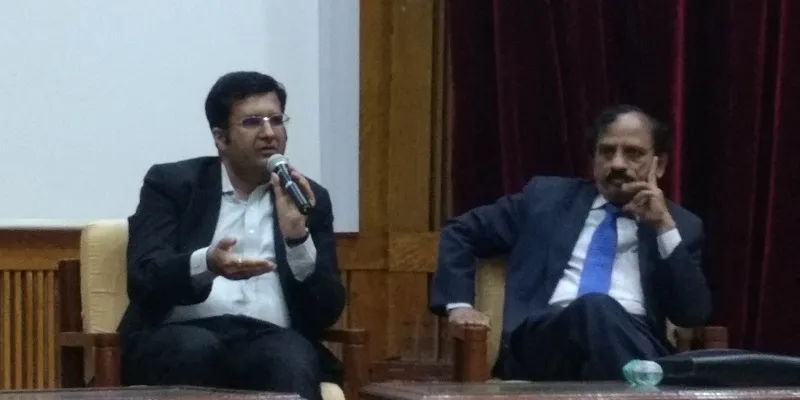8 learnings of a startup founder
“One of the toughest things about starting up isn’t the idea — they are a dime a dozen — execution, or even the financing; the toughest thing about a startup is building a team and finding the right partners, who are like-minded,” said Karnvir Singh Mundrey, Founder and Director, Atharva Lifesciences Consulting Pvt. Ltd, on Saturday at IIM Bangalore’s event Eximus.
Karnvir had initially come to India to set up a private equity firm, but on getting here he found a much bigger problem — lack of information in every sphere.

As he was interested in science, he decided to start up in the area of science and biotech pharma. Speaking to the student body at large, Karnvir says,
You have one of the biggest advantages of starting up. It is in universities and colleges that you have time to spend with one another, and you can discuss things. The moment you leave, even to get a coffee with a friend on a weekend needs an appointment. It is in places like this that you find and build a team.
In his talk, Karnvir encapsulated his learnings in the below pointers:
Any graduation or post-graduation is just the beginning
Real businesses are very different from the Kotlers and Deckers you read. It is very fluid, and it needs hands-on experience. The longer you are in the field the better you will get at it. While starting up, it is very important to put your own skin in the game, take risks and make things work.
Evaluate your risk appetite
Citing an example, Karnvir says that whenever you want to start a new venture, most people will push you towards working on an idea that has never been explored before. However, you don’t always have to do that. “Sometimes innovation is better than invention in bringing new products into the market,” he says.
For Atharva Lifesciences, one of the biggest challenges was educating people about the product, which took a lot of time. There are times you can just focus on improving a solution that already exists. Even if you can improve it by 10 percent, it will be great.
Relationships are the key
It is the single most important thing in the world of startups and entrepreneurship. It is important to meet people and have actual conversations. He says,
The world is a circle. Be good to people, whether you are an employee or employer. It is important that you act ethically. You need to face the same people in the circle; it is necessary to have gratitude.
Start small
Neither does your business have to be worth Rs 100–200 crore, nor do you have to build a massive business that goes IPO. You don’t have to buy everything, and you don’t even have to hire employees full-time. Start with rental or part-time services. “One of the things we did wrong was buying a lot of things; in the end you end up doing a lot of management of the equipment and operations, which takes your focus away from innovation,” says Karnvir.
Evaluate everything as an asset or a liability
Whether it is a person or equipment, you need to evaluate the value of return you can expect. If you aren’t getting the expected returns, make sure you exit quickly, else you will bleed dry. Don’t let emotions overtake your actions in business. Karnvir says,
When you use something fully it becomes useful, and when you use something less, it becomes useless. We all do this at home, where we purge our drawers of all those things we don’t use that much. Similarly in a business, whatever assets you use less need to be removed or sold. It simplifies life.
Respect the old business class
In India, there are several people from family businesses and business classes that know something that no MBA will ever learn. It is important to learn from them, listen to them, and take from their wisdom and vision. Karnvir says it is good to have an old businessman or woman on your board to help advise you.
For senior management and CEOs — time spent in office is a waste
As senior management and founders, it is easy to get thrown off from ground realities. “As a rule, make it a point to not eat any meal alone. As a rule, every meal you eat must be with somebody — a friend, a business partner, an employee, or even somebody you can just share information with,” says Karnvir.
Every smartphone has a brilliant app — the phone
Nothing works better than just picking up the phone and talking to someone. It is so much better than messages, Whatsapp, Facebook, or even LinkedIn. It is important to have direct conversations with people because it makes building relationships that much easier.
Karnvir adds that at the end of everything, every founder, startup, and entrepreneur is different and you need to learn to have faith in yourself and your idea. The focus needs to be on your goal and not the naysayers.







